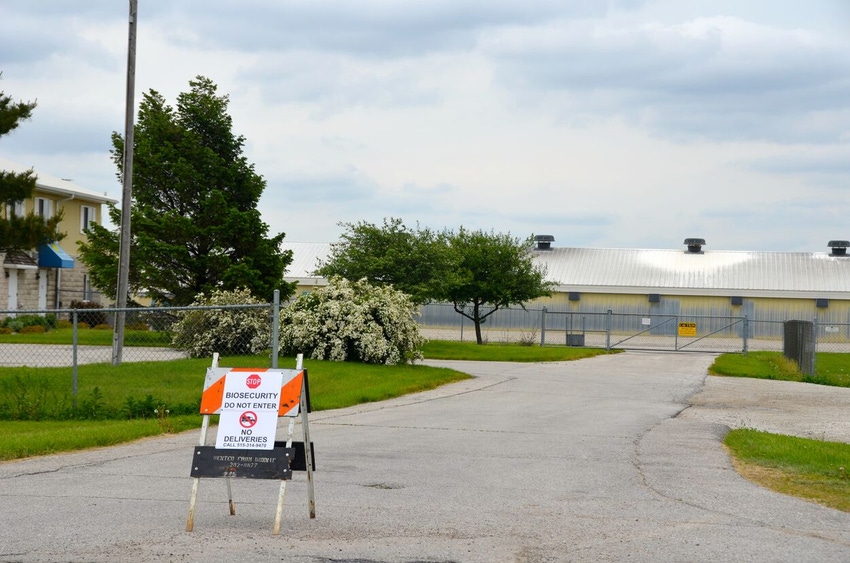Report: Land-grant universities key to agricultural biosecurity
"Boots on the Ground, Land-Grant Universities in the Fight Against Threats to Food and Agriculture" report describes lack of integrated plans for outbreaks.
May 10, 2022

Faced with disease threats to U.S. agriculture, land-grant universities such as Colorado State University must provide a first line of defense to protect public health, economic and national security and the livelihood of farm communities.
Emergent diseases pose major risks to the food supply of a globally connected economy in a world undergoing rapid transformation due to droughts and climate change. Recent outbreaks have disrupted agriculture security worldwide, while new pathogens such as African swine fever loom as a new threat to the U.S. pork industry.
Those are the key findings of a new report issued by a Washington D.C.-based, bipartisan, blue-ribbon commission. The commission works with a consortium of six land-grant universities, including CSU. The report, which originated at meetings CSU convened with the commission in 2019, details 15 recommendations to maximize the universities' effectiveness.
Titled "Boots on the Ground, Land-Grant Universities in the Fight Against Threats to Food and Agriculture," the 34-page report by the Bipartisan Commission on Biodefense casts the peril in a national and economic security context. Despite the danger, government policy and industry practices are not adequately prepared to respond to outbreaks that could affect crops, livestock and farms – a leadership void that select universities can help fill to benefit farmers and ranchers.
"Beyond coronavirus, parallel pandemics in plants and animals pose danger to American agriculture and world food security," says Alan Rudolph, vice president for research at CSU and a driving force behind the study. "Outbreaks of pathogens could cause serious food shortages, supply chain disruptions and harm the nation's economy, as well as companies and rural communities dependent on agriculture. Working with federal and state government, CSU and other land-grant institutions are uniquely positioned to lead as first responders and long-term problem solvers."
Today, highly pathogenic avian influenza is spreading across the United States and Colorado, resulting in destruction of commercial and backyard flocks of chickens. A scenario identified in the report describes $15 billion in losses to the U.S. pork industry if ASF reaches the United States. ASF has already swept 28 countries across Europe, Latin America, Asia and the Caribbean, wiping out millions of pigs.
However, the United States is ill-prepared for wildlife disease outbreaks. The new report describes inadequate federal funding and lack of integrated plans for outbreaks affecting food or agriculture. Fragmented surveillance and detection systems limit real-time information that decision-makers need to respond swiftly during outbreak.
The nation's 112 land-grant universities represent front-line responders because they have expertise as well as Extension operations in virtually every county in the country. The study identifies 15 recommendations for the universities, among them:
Drive federal engagement and coordination with land-grant universities to inform grant awards and improve food and agriculture defense research.
Incorporate all land-grant universities in national food and agro-biodefense activities.
Expand the role of land-grant universities in international surveillance and interdiction for food and agriculture defense.
Increase federal support for tribal land-grant institutions.
Establish a food and agriculture emergency response technical assistance program.
Improve distribution of pharmaceuticals, medical equipment and other essential medical supplies needed to treat those affected by large-scale food and agriculture events.
"A national defense against 21st century biological threats requires more than current public health and counter-bioweapon efforts," says former Homeland Security Advisor and Commissioner Ken Wainstein, who co-chaired the 2019 meeting at CSU. 'It demands a comprehensive One Health approach to protecting people, food, animals, plants, environments and bioeconomies to reduce disease and the socioeconomic consequences of naturally occurring outbreaks, laboratory accidents and biological attacks."
President Abraham Lincoln and Congress established the first land-grant universities in 1862. The institutions were charged with providing higher education to people of modest means and transferring practical knowledge to rural communities. Land-grant universities conduct research on infectious diseases, public health, medicine, animal and plant health and many other disciplines. CSU and some other universities were built on lands that once belonged to Native Americans.
"We can strengthen national biodefense of food and agriculture by funding and reinforcing the work of the land-grant universities before an event destroys food, crops, herds, textiles, biofuels and other agricultural products, and devastates our national and global economies," says former Senate Majority Leader and Commissioner Tom Daschle. "Land-grant universities have their boots on the ground. We need to provide them with what they need to win the war against threats to food and agriculture. It is too great a thing to be left undone."
The Bipartisan Commission on Biodefense was established in 2014 to conduct a comprehensive assessment of the state of U.S. biodefense efforts, and to issue recommendations to foster change. It works closely with the Coalition for Epi Response, Engagement and Science, which includes CSU, UC Davis, Texas A&M University, Iowa State University, University of Nebraska, University of Nebraska Medical Center and Kansas State University.
Source: Colorado State University, which is solely responsible for the information provided, and wholly owns the information. Informa Business Media and all its subsidiaries are not responsible for any of the content contained in this information asset.
You May Also Like

.jpg?width=300&auto=webp&quality=80&disable=upscale)

